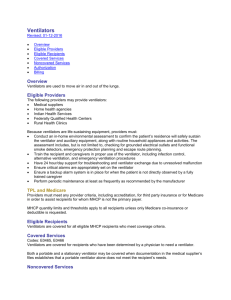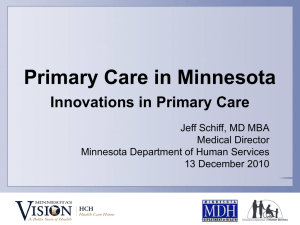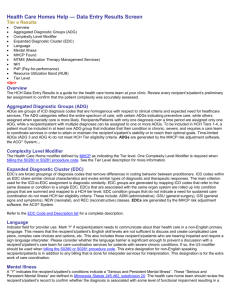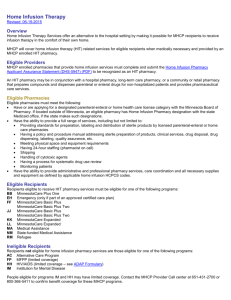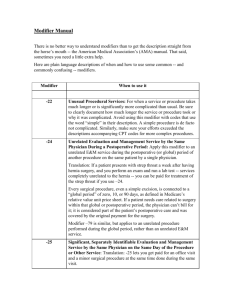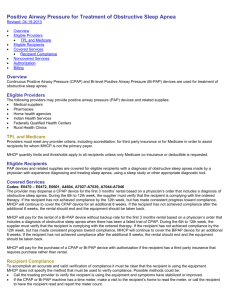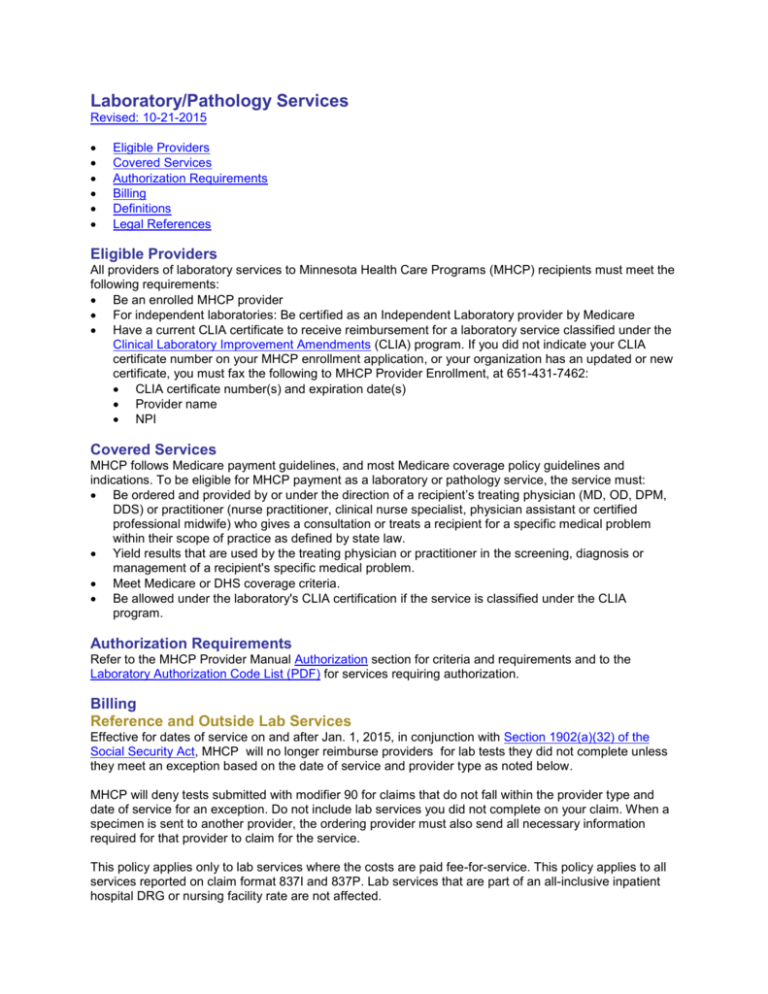
Laboratory/Pathology Services
Revised: 10-21-2015
Eligible Providers
Covered Services
Authorization Requirements
Billing
Definitions
Legal References
Eligible Providers
All providers of laboratory services to Minnesota Health Care Programs (MHCP) recipients must meet the
following requirements:
Be an enrolled MHCP provider
For independent laboratories: Be certified as an Independent Laboratory provider by Medicare
Have a current CLIA certificate to receive reimbursement for a laboratory service classified under the
Clinical Laboratory Improvement Amendments (CLIA) program. If you did not indicate your CLIA
certificate number on your MHCP enrollment application, or your organization has an updated or new
certificate, you must fax the following to MHCP Provider Enrollment, at 651-431-7462:
CLIA certificate number(s) and expiration date(s)
Provider name
NPI
Covered Services
MHCP follows Medicare payment guidelines, and most Medicare coverage policy guidelines and
indications. To be eligible for MHCP payment as a laboratory or pathology service, the service must:
Be ordered and provided by or under the direction of a recipient’s treating physician (MD, OD, DPM,
DDS) or practitioner (nurse practitioner, clinical nurse specialist, physician assistant or certified
professional midwife) who gives a consultation or treats a recipient for a specific medical problem
within their scope of practice as defined by state law.
Yield results that are used by the treating physician or practitioner in the screening, diagnosis or
management of a recipient's specific medical problem.
Meet Medicare or DHS coverage criteria.
Be allowed under the laboratory's CLIA certification if the service is classified under the CLIA
program.
Authorization Requirements
Refer to the MHCP Provider Manual Authorization section for criteria and requirements and to the
Laboratory Authorization Code List (PDF) for services requiring authorization.
Billing
Reference and Outside Lab Services
Effective for dates of service on and after Jan. 1, 2015, in conjunction with Section 1902(a)(32) of the
Social Security Act, MHCP will no longer reimburse providers for lab tests they did not complete unless
they meet an exception based on the date of service and provider type as noted below.
MHCP will deny tests submitted with modifier 90 for claims that do not fall within the provider type and
date of service for an exception. Do not include lab services you did not complete on your claim. When a
specimen is sent to another provider, the ordering provider must also send all necessary information
required for that provider to claim for the service.
This policy applies only to lab services where the costs are paid fee-for-service. This policy applies to all
services reported on claim format 837I and 837P. Lab services that are part of an all-inclusive inpatient
hospital DRG or nursing facility rate are not affected.
Date ranges affected by this policy
Note the following three date ranges affected by this policy:
Dates of service before Jan 1, 2015: all providers may choose to bill for lab tests or services sent to
another provider by indicating the reference lab’s NPI as the rendering provider on claim format 837P.
Use modifier 90 and place of service 81 (independent lab) for dates of service before Jan. 1, 2015.
Dates of service between Jan 1, 2015, and Oct 1, 2015, outpatient hospitals, provider-based clinics,
and independent laboratories only may continue to bill for lab services performed by a reference or
outside lab.
Dates of service on and after Oct 1, 2015: Outpatient hospital labs and provider-based clinics may
continue to bill for laboratory services performed by a reference or outside lab under specific
circumstances. Providers that bill on the 837I should continue to bill as normal—the 90 modifier is not
required. Providers that bill on the 837P should continue to use the 90 modifier and use the place of
service where the sample was taken on all reference lab tests.
Note: A staff-model clinic that is part of a health maintenance organization (HMO) licensed by the
Minnesota Department of Health under Chapter 62D may bill for lab tests performed at other sites within
the same HMO. Lab services performed by a reference or outside lab that is not part of the same HMO
must be billed by the lab that performed the test.
Exceptions
The following dates of service may qualify for an exception to this policy:
Dates of service between Jan 1, 2015, and Oct 1, 2015: the following three provider types only may
continue to bill for lab services performed by a reference or outside lab:
Outpatient hospitals
Provider-based clinics (hospital-owned clinics authorized with a provider-based status according
to federal regulations)
Independent laboratories, when the service was referred to another independent lab or hospital
Dates of service on and after Oct 1, 2015: An outpatient hospital laboratory or provider-based clinic
may continue to bill for laboratory services performed by a reference or outside lab and only if the lab
is providing services either as part of the hospital or when operating under an arrangement that is
within the scope of the hospital's certification. In this situation, MHCP can either pay the laboratory
directly or pay the hospital with which it is affiliated. (Refer to Medicare direct payment requirements
at 42 CFR 447.10.)
A staff-model clinic that is part of a health maintenance organization (HMO) licensed by the Minnesota
Department of Health under Chapter 62D may bill for lab tests performed at other sites within the same
HMO. Lab services performed by a reference or outside lab that is not part of the same HMO must be
billed by the lab that performed the test. HMO’s wishing to use this exception must provide to DHS a list
of the staff-model clinics or labs (including the NPIs) within the HMO that will be billing for services that
other labs within the same HMO provide.
Also refer to Provider Update MHCP Pays Reference and Outside Laboratory Providers Directly (MHP14-08). )
Minnesota Family Planning Program (MFPP) lab tests and services
Refer to the MFPP Billing, Lab Services entry on the MFPP section of the provider manual for information
regarding MPP lab tests and services.
Unlisted Codes
According to the HCPCS codebook, if you provide a service that is not accurately described by HCPCS
CPT procedure codes, you may report the service using an unlisted procedure code.
Before considering using an unlisted or NOC, procedure code, you must determine if another more
specific code could describe the procedure or service being performed or provided. If there is no more
specific code available, you may use an unlisted code and must attach documentation to the claim to
justify the use of the unlisted procedure code and to describe the procedure or service rendered. If the
documentation includes multiple tests, you must note which test is being claimed with the unlisted code.
Date of Service
Do not bill a date span for services defined as multiple treatments or units of service.
Units
Bill laboratory tests that are not repeats in units; do not use the repeat modifier.
Examples: Bill blood, urine and other cultures in "units of." Bill multiple organism ID’s in "units of."
Test Components
When billing for lab services and you own the equipment used, the services cannot be separated into a
professional and technical component. Bill the appropriate code without a modifier.
CLIA Tests
To bill CLIA waiver tests, certain procedure codes must have the modifier QW. Do not use your CLIA
number on the claim transaction. Do not use the QW modifier for services excluded from CLIA edits or for
waived tests that don’t require modifier QW.
Outpatient Hospital Laboratory Tests
Effective for dates of service on or after Jan. 1, 2014, MHCP follow Medicare hospital outpatient clinical
laboratory test payment and billing policy, except where services under arrangement and referred lab
services are concerned. Most clinical diagnostic laboratory tests (excluding molecular pathology test)
performed in an outpatient hospital setting are packaged under the Outpatient Prospective Payment
System (OPPS), instead of the Clinical Laboratory Fee Schedule (CLFS).
Refer to MLN Matters SE 1412 for additional information.
Automated Multi-Channel Laboratory Organ or Disease Oriented Panels
The organ and disease oriented panel codes represent chemistry tests frequently performed in
combinations on automated multi-channel equipment. When combinations of these tests are provided for
a recipient on the same date, claims submitted to MHCP are subject to a payment cap specified by CMS
for the Medicare program.
All multi-channel laboratory tests performed on the same date for the same recipient must be submitted
on one claim transaction. Billing the complete automated chemistry panel is advisable if all tests are
done. Additional tests for the same date and same recipient submitted on a separate claim are
considered part of the panel will be denied as a duplicate test.
If subsequent tests are provided for the same patient on the same date, submit a replacement claim
(PDF), and include the additional tests on one claim transaction.
The Physician's Current Procedural Terminology (CPT) manual defines the organ and disease oriented
panel codes. If other tests are performed in addition to those indicated for a particular panel, report the
tests on individual lines on the claim, along with CPT panel codes.
Do not separately report individual laboratory tests that are components of a multichannel test analysis.
MHCP will process Medicare crossover claims as submitted per Medicare's billing instructions in the
Medicare Claims Processing Manual (PDF).
Specimen Collection and Handling
Effective for dates of service July 1, 2012, and after, MHCP will no longer reimburse for collection of
blood by access port in conjunction with another service. These services are incidental or included in a
primary service.
MHCP will cover collection and handling (if applicable) for each of the following types of specimen per
recipient per day:
Routine venipuncture for collection of specimens
Collection of pap smears
Catheterization for collection of a specimen, single homebound, nursing facilities
Catheterization for collection of a specimen, multiple recipients
MDH Newborn Screening Program
Effective for dates of service on or after Jan. 1, 2013, MHCP will cover the cost of the MDH newborn
screening for metabolic disorder card when the screening cannot be completed at the inpatient hospital
or birthing center setting with HCPCS code S3620. If MDH requests a repeat newborn screening card, bill
with S3620 and modifier 76 or 77.
MHCP includes the payment for the newborn screening card in the DRG or facility service when provided
in the inpatient hospital or birthing center. Do not bill separately.
MDH Infectious Disease Reporting
MHCP will only cover handling and conveyance of specimen (CPT 99000) if both of the following
conditions are met:
A specimen (biological) is required to be submitted to MDH for infectious disease reporting
The provider uses a third party courier and incurs a fee to deliver the biological to MDH
You may claim the courier expense using the 837P claim and must identify the rendering provider number
as MDH (use UMPI# M306253800).
In all other instances CPT 99000 is incidental to the primary service and is not covered.
Laboratory Services in a Physician's Office
Payment for a laboratory service performed in a CLIA certified physician's laboratory will not exceed the
amount paid for similar services performed in an independent laboratory.
Pathology Services
Bill pathology services reported with the 26 modifier using the 837P. A CLIA-certified provider NPI must
also be included in one of the three provider fields: rendering, pay-to or service facility location.
Pap Smear
MHCP covers one professional and one technical component for Pap smear testing, per specimen per
day.
Genetic Testing
MHCP covers genetic testing when medically necessary. Genetic testing is considered medically
necessary when all of the following conditions are met and documented in the medical record:
The recipient displays clinical features or is at direct risk of inheriting the genetic condition in question
(pre-symptomatic)
The result of the test will have a clinically significant impact on the treatment being delivered for a
disease or syndrome
The testing method is considered scientifically valid for the identification of a specific genetically
linked inheritable disease
Appropriate genetic counseling occurs before and after testing. Counseling documentation supports
the intent to change therapy based on the results of the testing
Genetic testing is not covered when performed in the absence of symptoms or high risk factors for an
inheritable disease or when knowledge of genetic status will not affect treatment decisions. Tests for
conditions that are treated symptomatically are not appropriate since the treatment would not change due
to the test results.
Pharmacogenetic testing is covered when all the following conditions are met:
Testing is required by the drug label
The test will change the treatment course
A drug trial is considered impractical due to safety or other factors prior to genetic testing
MHCP does not cover cytogenetic testing for:
Legal, paternity or informational purposes
Family members who are not MHCP recipients
Fetus testing
Genetic Mutation Testing
The BRCA Genetic Mutation Testing for Breast & Ovarian Cancer Susceptibility: Authorization Criteria
(PDF) defines coverage criteria.
Oncotype Dx Testing for Breast Cancer
Oncotype Dx testing is a 21 gene assay test that aims to help breast cancer patients and their physicians
determine whether adjuvant chemotherapy would be beneficial. For dates of service on or after Jan. 1,
2012, testing is considered medically indicated for recipients with all of the following breast cancer
characteristic:
Stage I or II breast cancer
Breast tumor is estrogen-receptor positive
Breast tumor is HER2-receptor negative
Tumor size 0.6-1 cm with moderate/poor differentiation or unfavorable features, or tumor size >1 cm;
Negative lymph nodes (nodes with micrometastases > 2 mm in size)
Test result will be used to guide decision making about adjuvant chemotherapy
For dates of service on and after Nov. 1, 2010, report Oncotype DX testing for breast cancer with S3854.
Home Monitoring of Anticoagulant Therapy
For dates of service Jan. 1, 2012, and after, home use of Prothrombin Time (PT) testing and International
Normalization Ratio (INR) monitoring may be covered for recipients taking oral anticoagulation and with
mechanical heart valves, chronic atrial fibrillation, or venous thromboembolism if all the following medical
indications are present and if prescribed by the treating physician. The treating physician must also order
the home monitoring supplies.
The patient must have been anticoagulated for at least 3 months prior to use of the home INR device.
The patient must receive face-to-face education from the treating provider on anticoagulation
management and must demonstrate the correct use of the device prior to its use in the home.
The patient must continue to correctly use the device in the context of the management of the
anticoagulation therapy following the initiation of home monitoring.
Self-testing with the device should not occur more frequently than once a week.
Lead Toxicity Testing
The lead toxicity screening test consists of a capillary or venous blood lead test, hemoglobin (Hgb),
hematocrit (HCT), and other age-appropriate exams or tests (as noted in the schedule of age-related
screening standards). Refer to the Child and Teen Checkups (C&TC) section for more information
pertaining to lead toxicity testing.
The following lead testing services are not covered:
Paint chip, water and soil testing
Assessments performed by a registered environmental health specialist/sanitarian
HIV Tropism (Trofile assay) Testing
HIV Tropism testing is considered medically necessary for selecting recipients for treatment with HIV coreceptor antagonists.
MHCP covers tropism testing for recipients who meet all of the following criteria:
Failed antiretroviral treatments
Evidence of viral replication
Diagnosis of 042
Report HIV Tropism Testing using CPT 87999 with the description “HIV Tropism” in the line note. Limit of
once per lifetime.
Drug Testing
Drug screening for routine work related issues and when court ordered are not covered. For services
other than Medication Assisted Therapy, drug testing costs are not included in the CCDTF rate.
Effective for dates of service on and after April 1, 2014, drug screening is considered medically indicated,
as described in Medicare Local Coverage Determination L28145. Report drug screening using G0434 or
G0431 per encounter.
Definitions
Laboratory: A facility that performs laboratory testing on specimens derived from humans for the purpose
of providing information on diagnosis, prevention care, health assessment or treatment of diseases or
impairment.
Panel Codes: Groups of laboratory test (components) frequently performed together. Tests included in
each panel are listed by name with the CPT code identified in parenthesis. To report a panel code, all
listed tests must be performed.
Pathology: A service requiring additional medical interpretive decision, consisting of a written report
performed by a pathologist, at the request of a physician.
Professional Component: A physician’s exam (when indicated), performance or supervision,
interpretation, or written report of a diagnostic test.
Provider Performed Microscopy Procedures (PPMP): This allows physician office laboratories to
perform a limited number of microscopy procedures. Certified PPM approved procedures are subject to
change at any time.
Technical Component: Includes the personnel and materials, including contrast media and drugs, film or
xerography, space, equipment, or other facilities.
Waived Complexity: CMS has identified a number of simple laboratory procedures that can be
performed in the physician offices after obtaining a Certificate of Waiver. Waived tests are subject to
change at any time, so review all Medicare mailings for changes to waived test.
Legal References
Minnesota Statutes 144.123 Fees for Diagnostic Services, Exceptions
Minnesota Statutes 144.125 Tests of Infants for Heritable and Congenital Disorders
Minnesota Statutes 256b.0625 Subd. 54 Service Provided in Birth Centers
Minnesota Statutes 256.969 Subd. 29 Reimbursement for the fee increase for the early hearing detection
and intervention program
Minnesota Rules, 4605.7040 Disease and Reports; Clinical Material Submission
Minnesota Rules 9505.0305 Laboratory and X-ray Services
Minnesota Rules 9505.0445 Payment Rates
State Medicaid Manual, Section 4385 B
42 CFR 440.30 Other Laboratory and X-ray Services
42 CFR 441.17 Laboratory Services
42 CFR 441.56 Required Activities
42 CFR 493 Laboratory Requirements
CPT codes, descriptions and other data only are copyright 2010 American Medical Association (or such
other date of publication of CPT). All Rights Reserved. Applicable FARS/DFARS Apply.

